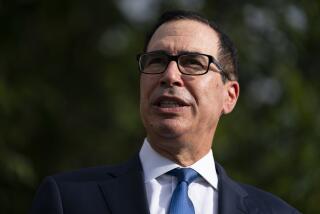Telecom Hypocrisy
- Share via
For years, Washington has hectored Europe about its protection of national telecommunications monopolies and keeping its markets closed to U.S. competitors. But if a group of Washington legislators led by Sen. Ernest F. Hollings (D-S.C.), has its way, the United States itself will now shut foreign phone companies out of the U.S. market. Hollings’ effort is wrongheaded; it probably would invite retaliation and undermine U.S. leadership in the global drive to open markets.
What riles Hollings is the attempt by Deutsche Telekom, a German company 56% owned by the government, to acquire a U.S. cellular communication company, VoiceStream Wireless Corp. He and 29 other lawmakers asked William E. Kennard, chairman of the Federal Communications Commission, to “carefully scrutinize” the $46-billion deal. He also introduced legislation that would prohibit the FCC from even considering mergers of U.S. and foreign government-owned telecommunications companies. Current law prohibits sale of a U.S. telecommunications firm to any business with more than certain levels of ownership by a foreign company or foreign government, but federal regulators may waive that provision for the sake of the public interest.
Largely because of Washington’s lead, barriers to the highly protected national telecom markets in Europe and elsewhere have begun to crumble. Rates for U.S. callers to other countries are coming down, and U.S. phone companies are expanding into overseas markets. The crowning achievement of the U.S. effort was a 1997 agreement among World Trade Organization countries to dismantle national phone monopolies and invite competition. As part of the agreement, the United States promised to remove legal limits on foreign ownership. Hollings had strenuously opposed the WTO agreement, and his bill is clearly aimed at defeating its purpose.
The FCC should of course closely examine the effect the Deutsche Telekom and VoiceStream Wireless deal would have on prices and the quality of service for U.S. consumers. It should address the question of whether the majority state ownership of DT would unduly shelter the company from competitive forces. Even invoking national security concerns, as Hollings does, is legitimate, although in this case the country involved is a close NATO ally. But barring the merger just because of government ownership, as proposed by Hollings, would be wrong. It would trigger a trade row with one of America’s closest trading partners and undermine future negotiations concerning market openings for U.S. companies.






